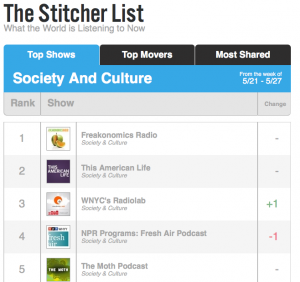On Tuesday Stitcher Radio announced the Stitcher List which is something like the Billboard Hot 100 for podcasts. Stitcher is a smartphone app that lets you listen to podcasts and other online radio on demand, with the “stitch” part of the name coming from the ability to create custom stations by stitching together different shows into a single channel.
The Stitcher List joins the iTunes podcast charts as one of the few sources for news and information about podcasts. I find this relative dearth of coverage to be interesting, given that the medium we call podcasting is now about seven years old, and is popular enough that most major broadcasters and media companies produce podcasts, and podcasters have garnered significant mainstream media attention. Yet, until the Stitcher List debuted most podcast producers and listeners alike pretty much only had the iTunes charts to rely upon for metrics and information about podcasts.
Aside from iTunes the Onion’s A.V. Club has been one of the most consistent champions of podcasting, reporting on the hosts and producers of podcasts, in addition to running a weekly review of the best podcasts. The A.V. Club’s roundup almost always leans heavily on comedy podcasts, although, admittedly, comedy podcasts (or podcasts produced/hosted by comedians) make up a significant percentage of the iTunes top podcasts.
It’s only somewhat ironic, then, that in April the A.V. Club’s Steve Heisler wrote an essay asking “Are we nearing comedy podcast overload?” That piece was followed four days later by Kyle Ryan’s “In defense of podcasts (even if they don’t make money),” also on the A.V. Club. To me, the first question was only relevant to the relatively small podcast audience that is also plugged in to the fact that there’s a comedy podcast community to begin with. It’s sort of like death metal fans debating if there’s a double-bass drum overload. It may be legitimate subject for debate, but it will still be mostly pointless to the vast majority of music fans.
Whether or not the question about comedy podcast overload is relevant, we are about to witness the first podcast cross-over to television with the debut of Comedy Bang Bang on IFC, based upon the podcast of the same name. My favorite podcast host-producer Marc Maron will be making his own IFC debut in the coming year with a show loosely based upon his WTF podcast.
Another sign of podcasting’s growing visibility was a mini-controversy that broke out a couple of weeks ago when popular tech blogger John Gruber made a sudden departure from The Talk Show podcast produced by the 5by5 network, only to emerge with a new podcast also called the The Talk Show on a different network. While this story didn’t exactly light up the entertainment gossip pages, much of the tech blogosphere took notice, sparking a great deal of speculation on the cause of the split.
Responding to some commentators who made light of anyone caring about the split, blogger Jonathan Portisky wrote a well-reasoned defense as for why the story should matter. Portisky compared podcasts to television, observing
People care about these shows. They listen to them regularly and discuss them among friends the way a bygone generation would talk about Uncle Miltie. Listeners are personally connected to these shows. We welcome these hosts into our lives every week to be entertained and inspired. There is absolutely a relationship between host and listener and it is a very personal, intimate one. Otherwise what’s the point?
People care about this story because they care about these people.
Podcasts may not yet have an audience the size of prime-time television show or syndicated radio program, but that doesn’t lessen the impact on the the people who listen. That enough people listen to any one podcast to generate such an internet kerfuffle indicates that they’re listening and they care. And, perhaps in response to the hubub, the new version of The Talk Show is currently #8 in the iTunes top 10 for the US this week, a position I don’t think it’s occupied before.
It looks like 2012 is shaping up to be the year that podcasting matures, taking its place as a full member of the digital media landscape, rather than being a backwater or afterthought whose very premise needs to be constantly re-explained. For me, it’s just another sign of the enduring power of audio media and how podcasting is the next iteration of radio.



